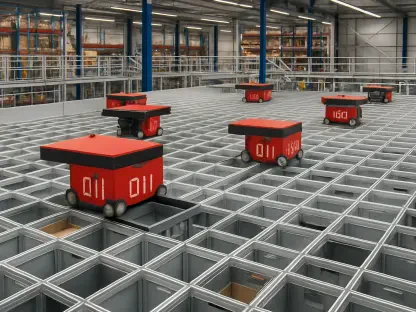The energy sector is undergoing a significant metamorphosis, driven largely by digital transformation initiatives that are reshaping how companies approach sustainability, operational efficiency, and workforce empowerment. This shift is highlighted by partnerships, such as the collaboration between RWE AG and Infosys, aimed at enhancing organizational agility and employee experience through advanced technological solutions. With an emphasis on process automation and digital workplace transformation, these strategies are not only rejuvenating operational frameworks but are also setting new standards for sustainability in the energy landscape. As companies like RWE integrate cutting-edge technologies, it becomes clear that digital transformation is not merely a choice but a necessity for thriving in this evolving industry.
The Role of Advanced Technologies in Energy Companies
Transforming Workplaces with Innovative Solutions
One key facet of digital transformation is its impact on workplace environments. For companies like RWE AG, deploying the Infosys Workplace Suite has been a cornerstone effort in creating a more agile, resilient, and user-centric digital workplace. This initiative involves the automated migration to Office 365, the implementation of sophisticated collaboration applications, and the use of business dashboards to streamline workflows. By integrating Azure-powered conversational bots and automating service requests, employees are equipped with more efficient tools, enhancing their productivity and leaving more room for innovation and strategic focus. As these technologies become more entrenched in the fabric of daily operations, they enable energy companies to align their business objectives more closely with sustainability goals.
The transformation goes beyond mere technological upgrades. By empowering employees with user-friendly, advanced systems, energy firms are fostering an environment where talent is nurtured, and innovative thinking is encouraged. The partnership between RWE and Infosys exemplifies how adopting the latest digital capabilities can create a work culture where efficiency is maximized, and operational challenges are addressed proactively. This, in turn, contributes to healthier working environments, potentially reducing attrition rates and improving overall job satisfaction. Consequently, such digital-driven strategies could serve as a blueprint for other energy firms looking to enhance their workplace environments to meet modern efficiency standards.
Industry-Wide Trends and Innovations
The trend of integrating advanced technologies is not limited to a few industry leaders but has permeated the broader energy sector. Organizations are increasingly adopting AI-led business transformation to boost operational efficiency, as illustrated by Just Energy’s collaboration with HCLTech. This partnership focuses on harnessing digital process outsourcing combined with AI platforms to optimize operations and improve service delivery. These collaborations highlight the growing consensus that innovative technology integration is pivotal for achieving competitive advantages in the energy market. By investing in these technologies, energy companies can gain insights from data analytics, allowing for more informed decision-making processes and highlighting areas for improvement or innovation.
The strategic implementation of AI and automation technologies also underscores a broader commitment to sustainability and operational excellence. As companies like Just Energy explore these innovative avenues, they are paving the way for others in the industry to follow suit. These initiatives demonstrate the value of collaborative efforts in driving sector-wide transformation by pooling resources and expertise to achieve common goals. Moreover, as these technologies become more affordable and accessible, even smaller players in the energy market will be able to embark on their digital transformation journeys, creating a ripple effect that enhances the industry as a whole.
The Future of Digital Transformation in Energy
Sustaining Growth Through Continuous Innovation
As the digital transformation of the energy sector continues to unfold, the focus on sustained growth becomes paramount. Companies already investing in these technologies are witnessing the benefits in terms of improved efficiency and reduced operational costs. For instance, the strategic initiatives seen in partnerships like that of RWE and Infosys serve as significant examples of how to align technological adoption with business goals to propel growth. Their collaboration exemplifies a forward-thinking approach emphasizing the integration of technology into core operations to streamline processes and support sustainable development, showcasing the profound impact digital transformations can have when effectively implemented.
Continuous innovation remains at the heart of these transformative initiatives. As technologies evolve, the energy sector must adapt and leverage these advancements to maintain a competitive edge. This requires a proactive mindset that values flexibility and resilience, emphasizing the importance of continually reevaluating and upgrading technological landscapes. By embracing change and fostering a culture of continuous learning, energy companies can better position themselves to capitalize on new opportunities, ultimately ensuring long-term sustainable growth within an increasingly digital world. Embracing this mindset is crucial, as staying ahead of technological advancements is not just a competitive strategy but an imperative for survival in the modern energy landscape.
Moving Forward in a Digitally Driven Future
Digital transformation has significantly impacted workplace environments. For organizations like RWE AG, introducing the Infosys Workplace Suite is vital to fostering a more adaptable, resilient, and employee-centered digital setting. This effort includes automating the shift to Office 365, implementing advanced collaborative tools, and utilizing business dashboards to streamline tasks. By integrating Azure-based conversational bots and automating service requests, employees gain access to more efficient tools, bolstering productivity and freeing time for innovation and strategic pursuits. These technologies deeply ingrained in daily operations enable energy firms to better align business objectives with sustainability goals.
The shift transcends just tech upgrades. Empowering staff through user-friendly systems, these energy companies nurture talent and encourage creativity. The RWE and Infosys partnership is a model of adopting cutting-edge digital capabilities to foster a culture of productivity and proactive problem-solving. This approach enhances working environments, potentially lowering attrition and boosting job satisfaction, providing a blueprint for other firms aiming to meet modern efficiency standards.









